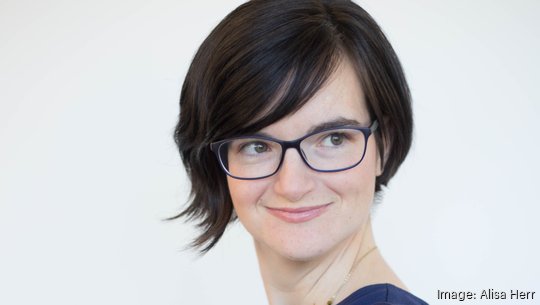
“Scraping the bottom of the barrel.”
That’s how entrepreneur Alisa Herr, founder of Unity Web Agency, describes her outlook a year ago amid a seemingly never-ending anxiety spiral where unanswered emails were stacking up. She had been in therapy, but she wanted more than coping strategies this time. She wanted to know what was behind the issues.
So she made an investment – spending thousands out-of-pocket for an assessment to see if ADHD might be the answer.
She was shocked when, in addition to ADHD, she was diagnosed with autism.
In an interview, Herr talks about how she grew from self-taught coder in Cary to launch her own company, and why finding answers about herself – and talking about them – matters.
Becoming a coder
Herr, the daughter of parents who worked at SAS Institute, started coding in middle school. Her dad taught her the basics “and I just went from there.”
She remembers making fan websites for bands that she liked, creating sites for school projects, even helping build the website for her high school, Cary Academy.
But she never envisioned it as a career – something she attributes to a lack of role models. But after being unable to find a job in the recession with a master’s degree in library science from UNC, she fell into a junior web developer role at Durham firm Cuberis – and it clicked.
The self-taught coder faced a sink-or-swim scenario, and by the time she left to be CTO of EducationNC four years later, Herr was leading her own developer team. New opportunities were tough to come by, however. She felt gender bias from vendors and suppliers. And as a mom to two young kids, the culture fit of jobs she found online didn’t seem to mesh.
“It came down to this moment where I just realized … starting my own business would be easier than getting a job,” she said.
Herr said she wanted to create a business “where culturally, people fit in even if they were misfits elsewhere.” But she also wanted a common cause, a mission.
Herr, whose spouse had been diagnosed with MS, was already passionate about disability advocacy.
“It became clear to me that this was my mission,” she said. “This was what I needed to do with my company – to build a company that’s great for the people who work for it, and is also great for the world.”
Unity Web Agency became certified as a B-Corp in 2018. And it will soon add its seventh employee.
Herr knows jumping off the entrepreneurial cliff was a risk. She had a 4-year-old and a 1-year-old, and they were about to all be supported – at least for a while – by her spouse’s state salary.
But gradually, the clients came.
What didn’t come, however, was peace of mind. Herr had struggled with mental health for much of her life – anxiety and depression. And the pandemic “did not help.”
The diagnosis
She started reading about ADHD and neurodiversity. And the comparisons seemed obvious – trouble focusing, trouble finishing projects. So she got evaluated.
The full diagnosis, however, sent her world “crashing down.”
Herr’s understanding of autism was the stereotype. She didn’t yet understand that it’s a spectrum. So she started educating herself, particularly about how women can experience autism differently.
“I started seeing parts of myself in that,” she said. Reading about autism and meeting other neurodivergent business owners helped her understand – and it created a community.
Getting a diagnosis helped her understand herself and her strengths, she said. And communicating strengths and limitations with her direct reports has helped her company run efficiently, she said.
The diagnosis has also helped her realize that some of her own expectations needed to be curbed.
“I’m never going to be that person that can just charm a room by like, walking into it … but if I change the room I’m walking into, or if I start surrounding myself with other entrepreneurs with disabilities, then it’s a totally different space,” she said. “It feels more comfortable.”
Herr finds people with disabilities are often more creative than the neurotypical population because “they have to find creative solutions to problems they face every day.”
“There’s this perseverance in the community,” she said.
And everyone is different. When Herr was initially diagnosed earlier this year, she felt imposter syndrome – like she didn’t belong in the autism community.
“I felt like I had suddenly acquired a disability, that I didn’t belong there,” she said. But hearing other people’s stories – other people who had the same thoughts – helped.
Herr recently shared her experience on LinkedIn.
“I’d been sitting on this for months and thinking about it, and figuring out how to say what I’m thinking,” she said. “I just wanted to start. Because there’s people out there like me.”
According to the Centers for Disease Control, 1 in 36 children in the U.S. is diagnosed with an autism spectrum disorder. The CDC estimates that more than 5.4 million adults in the nation are on the spectrum.